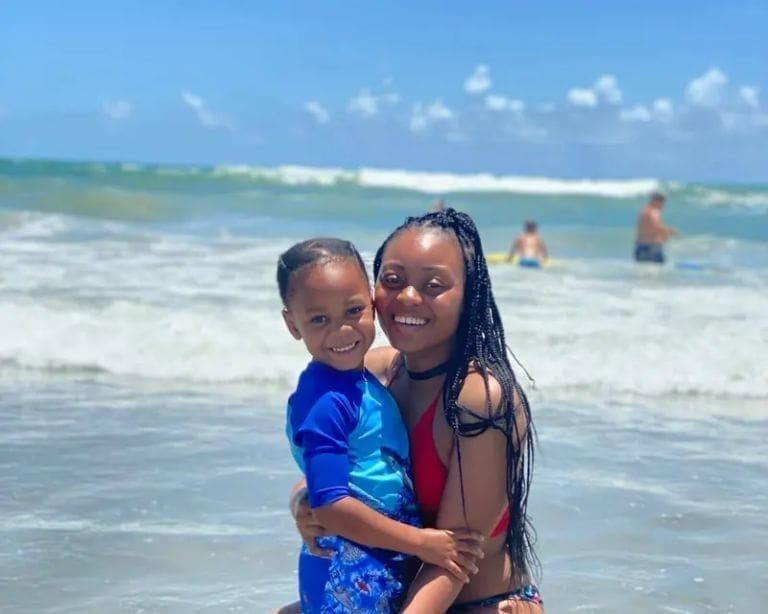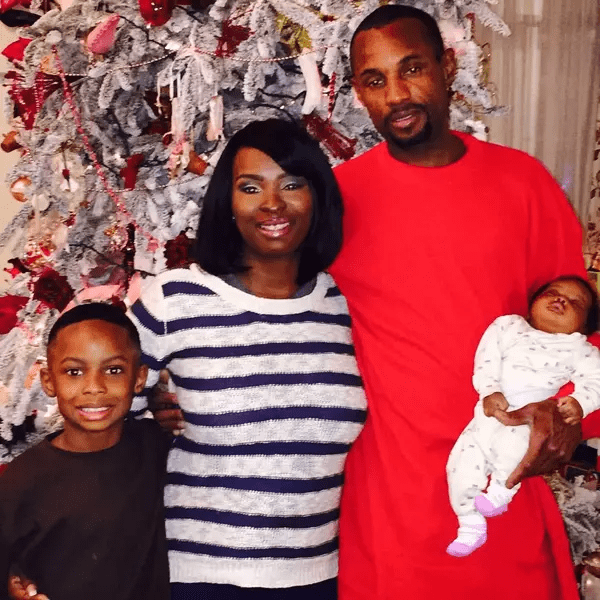At a campaign rally in Atlanta last month, Vice President Kamala Harris remembered Amber Thurman, the 28-year-old daughter, sister and mother who worked as a medical assistant and had dreams of becoming a nurse. She died of complications from her abortion in the weeks after the Supreme Court’s ruling ending federal protections for the procedure.
This column first appeared in The Amendment, a biweekly newsletter by Errin Haines, The 19th’s editor-at-large. Subscribe today to get early access to future Election 2024 analysis.
“We will speak her name … Amber Nicole Thurman,” Harris said to the audience, who repeated her name back.
Harris — who also highlighted Thurman’s story at a town hall with Oprah Winfrey in Michigan the night before — continued, tying Thurman’s death directly to former President Donald Trump and to a broader conversation about reproductive access.
“One in three women in America lives in a state with a Trump abortion ban,” Harris said. “Think about that when you also combine that with what we know has been long-standing neglect around an issue like maternal mortality … Where you been when it comes to taking care of the women and children of America?”
Thurman was a Black woman and the first documented preventable death due to the 2022 Supreme Court decision and abortion bans that followed.
Harris’ remarks centering the consequences for Black women like Thurman represent a narrative shift in how Democrats have largely talked about this issue. Advocates say it’s a more inclusive and intentional message that brings attention and awareness to the disparities around reproductive access using the power of a presidential campaign.

As the second most powerful person in the country, Harris is able to use her voice on their behalf in a way that many of the Black women impacted by a lack of access to reproductive care are not.
“In using her platform to highlight these experiences, Kamala Harris is doing the critical work of reminding and recentering the public on where we’ve always known the harm would be felt most acutely,” said Planned Parenthood President Alexis McGill Johnson. “She has spent her career fighting against inequities in both maternal health and criminalization, which is why she is able to thread these needles powerfully and authentically.”
Both before and after the decision in Dobbs vs. Jackson Women’s Health Organization, Harris met with leaders in higher education; the faith community; health care providers; local and federal elected officials; civil rights leaders; constitutional law, privacy and tech experts; and reproductive rights activists to consider the impacts of an end to a federal right to abortion.
During the 2022 midterm election, the vice president was the administration’s staunchest surrogate on abortion. She quickly framed the issue as one of democracy and rights.
She also spoke about maternal health, with a particular focus on the crisis facing Black women, who are three times more likely to die from a pregnancy-related cause as White women.
Still, in the weeks and months following the high court’s ruling in Dobbs, many reports of the fallout focused on White women and girls who survived harrowing experiences. They usually focused on the most extreme cases, often highlighting stories of patients who are married and intentionally pregnant. Such narratives drew shock, empathy and anger from around the country.
But for many Black women who are impacted, coming forward with their experiences is not always easy. They are already discriminated against or not believed in a range of medical settings. And there are cultural factors: Attitudes about Black women’s sexuality and personal responsibility and the fear of criminalization can contribute to stigma and shame for those who choose to share their story — especially for a national audience — and return to their communities.
Republicans seized on Thurman’s story to say it was actually about the impact of abortion, not abortion bans, despite what an official state committee said. Kaitlyn Joshua, a Black Louisiana resident who spoke at the Democratic National Convention about her experience trying to get miscarriage care, had her state’s attorney general cast doubt on her story.
“As we’re thinking about the storytelling and whose stories get to be told, Americans need to get more comfortable with these other stories for us to have the most robust policy solutions possible,” said Mini Timmaraju, president of Reproductive Freedom for All. “There is a certain level of privilege that comes with being able to tell your story. This is a critical time for the campaign to center Black women’s stories. … It’s a big moment.”
While women of color and queer women have long been fighting for reproductive rights, particularly because of the disparities they face, it has only been recently that they have become the leaders of these national reproductive rights organizations. Many have met with Harris in the years since the Dobbs decision. They see Harris as an ally with a longtime commitment to these issues, who is listening and learning from people on the ground impacted by and responding to the realities of the restrictions.
Harris’ focus on Black women, advocates say, is helping. On Saturday, a group of nearly 200 organizers, activists, allies and elected officials held a rally and vigil at the Georgia Capitol for Thurman and Candi Miller, another Black woman in the state who died after getting an abortion in the wake of the Dobbs decision. The event was part of the “Trust Black Women” campaign anchored by Sister Song, a reproductive justice collective of women of color.

The intersectionality of the crowd and the level of interest on short notice just days after Hurricane Helene, were partly due to Harris’ recent visit to Atlanta with a focus on Black women and reproductive health, said Sister Song executive director Monica Raye Simpson.
“This isn’t a new battle for her, but she’s using the campaign trail to do what she’s been doing.” Simpson said. “As national grassroots organizations, our reach is only going to be so much. When we have a national spotlight from something as large as a presidential campaign, there is no choice but to pay attention to what is happening on the ground. The moment we’re in has created an opening for those of us who have been ready to go — and we’re ready to march through.”
On Monday, a Georgia court struck down the state’s six-week abortion ban. In the decision, the judge cited the ban’s disproportionate impact on women of color.
“It is generally men who promote and defend laws like the LIFE Act, the effect of which is to require only women – and, given the socio-economic and demographic evidence presented at trial, primarily poor women, which means in Georgia primarily black and brown women – to engage in compulsory labor, i.e., the carrying of a pregnancy to term at the government’s behest,” Fulton County Superior Judge Robert McBurney wrote.
While the decision may not survive court challenges, it is drawing attention to the disparate impact of the abortion ban. To Simpson, this wouldn’t have happened without activists on the ground and Harris spotlighting the issue.
“There’s a narrative that hasn’t necessarily centered Black and Brown faces,” said Simpson. “Because, in this particular instance, we really did frame this message around ‘trust Black women,’ I really think it changed the outcome.”
This post contains content that was first published on 19th News and republished here under a Creative Commons License. Read the original article.









